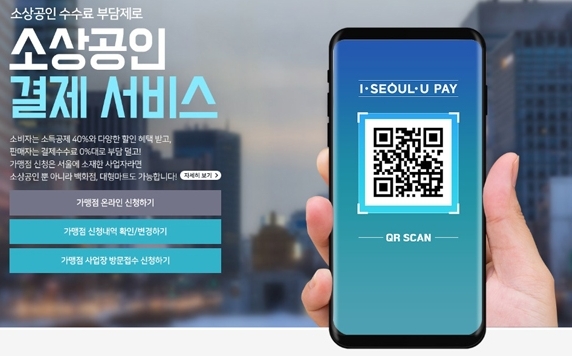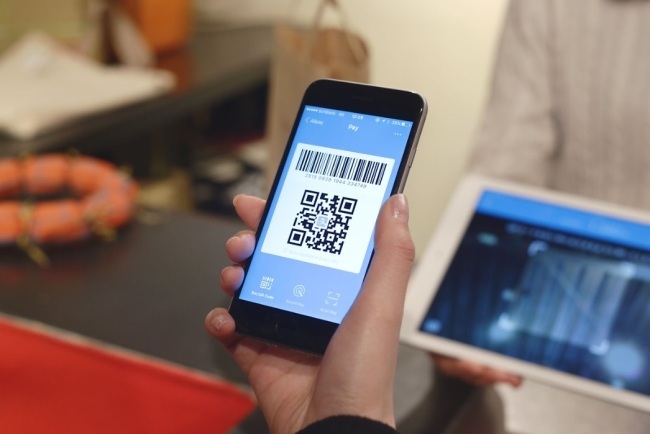South Korea’s capital city is poised to set up a state-sponsored financial infrastructure project aimed at lowering card payment-processing costs for small merchants.
But there are already doubts about the plan’s sustainability due to the lack of a revenue model.
The operation of what is called “Zero-Pay,” referring to near-zero payment-processing fees, will start in December, but the date of the launch has yet to be confirmed, according to state sponsors the Ministry of SMEs and Startups and the Seoul Metropolitan Government.
Through Zero-Pay, customers in Seoul will be able to use their smartphones to scan a QR code to make a payment at an offline store. If the payment is settled through a QR code standardized by the financial authorities, the money will move directly from the customer’s bank account to the vendor’s account. If the customer’s bank account lacks sufficient funds, the transaction will be declined automatically.
As the next step, the government plans to adopt a “customer-presented mode,” where a merchant would scan a QR code from the customer’s mobile phone, in the first half of 2019.
 |
(A screenshot from Zero-Pay's promotional website) |
The objective is to provide additional choices both for consumers and merchants in a nation dominated by a multilayered infrastructure where card companies and other intermediaries, such as operators of payment gateways and value-added networks, get a cut of every payment. More than four-fifths of Koreans hold at least one credit card, while over 7 out of 10 payments involve either a credit, debit or prepaid card, according to data from the Bank of Korea.
But the cost of building the infrastructure, which includes various payment networks, is estimated to reach 3.9 billion won ($3.5 million). Maintaining the franchise network will cost 3.5 billion won each year, according to the Korea Financial Telecommunications and Clearings Institute. KFTC, a nonprofit organization that manages interbank payment systems here, is one of the participants in the Zero-Pay project.
Moreover, if all 660,000 small vendors in Seoul chose to process their payments through the Zero-Pay network, banks would lose out on an estimated 76 billion won in processing fees from merchants each year, according to main opposition Liberty Korea Party Rep. Kim Yong-tae.
The SME Ministry announced early in November that 18 financial institutions and 10 electronic financial business entities had joined the project. But financial service provider KakaoPay and credit-card company BC Card withdrew from the project, despite their pledges in the form of a memorandum of understanding signed in July.
The news came amid serious doubts about the platform’s sustainability.
“Under the circumstances, companies participating in the project (would have to accept) losses for the sake of the common good,” wrote Youn Tae-hoon, a researcher at Korea Institute of Finance, in a note Friday, adding that the plan’s long-term sustainability was questionable and its promised benefits for consumers appeared unlikely.
This echoed a remark by Choi Jong-ku, chairman of the Financial Services Commission, in a parliamentary audit in October.
“A forced policy cannot advance to sustainability and will face limitations,” Korea’s top financial policymaker said. “A separate study should be made on how inefficient it is for autonomous governments to (get involved in the) management of franchise merchants.”
The FSC has been on a path to provide financial assistance to small vendors, with measures including the revision of the Enforcement Decree of the Specialized Credit Finance Business Act.
But Lee Kyoung-jun, a business management professor at Kyung Hee University, criticized the Zero-Pay project as a potentially harmful instance of government intervention in pricing mechanisms.
“An unsustainable business model creates a vicious circle,” Lee told The Korea Herald.
To compete with Zero-Pay, a credit-card company could choose to cut its own card-processing fees or to minimize losses by cutting costs in other areas, such as discounts or benefits for cardholders. This would in turn place the burden on customers, he explained.
“If consumers spend less, vendors will be affected.”
 |
(Herald DB) |
Anticipation for the project was high, as its intentions resonated with the Moon Jae-in administration’s policy direction of support for marginalized segments of Korean society. The payment infrastructure, without intermediaries, was expected to help small vendors better make ends meet.
Small Korean vendors, locally dubbed “sosanggongin,” often spend 30-50 percent of their operating profits on card-processing fees, according to the Ministry of SMEs. For vendors with over 500 million won in yearly income turnover, an average of 2.3 percent of that income is sent to card companies in payment-processing fees. Those with yearly revenue of between 300 million won and 500 million won spent 1.3 percent of their incomes on card commission fees as of August 2017.
Zero-Pay’s bank-to-bank payment network would involve lower processing fees. The processing fee imposed on merchants would be lowered to 0.5 percent at most for a merchant running a small store with a maximum of five employees. Merchants with turnover of less than 800 million won would be exempted from Zero-Pay processing fees.
To consumers, making payments through the highly touted infrastructure will lead to a 40 percent tax deduction on the payment, as compared with only 30 percent on debit-card and cash transactions and 15 percent on credit-card transactions.
But it appears not all Korean consumers welcome the new payment infrastructure.
Hwang Yoon-seong, a 31-year-old Seoul resident, said the introduction of a new means of payment gives him little incentive to stop using his credit card.
“Credit cards offer a bunch of discount offers to consumers, and the choice of Zero-Pay over credit card will not reimburse me for the loss of benefits,” he said.
Another Seoul resident -- Kim Eun-pyo, 28 -- said, “The discount offers and reward points from credit-card companies seem larger than the tax benefits from the use of Zero-Pay.”
The Zero-Pay project organizers will also face an uphill battle against the challenges of QR code-based payment networks from domestic card companies.
BC Card launched Korea’s first QR code-based payment system where users’ card information is displayed on mobile phones in the form of a QR code in October. Also, BC Card, Lotte Card and Shinhan Card are awaiting regulatory approval for a new QR code-based payment system in “merchant-presented mode,” where mobile phone holders scan QR codes presented by the vendor in order to pay.
By Son Ji-hyoung
(
consnow@heraldcorp.com)








![[Weekender] Korea's traditional sauce culture gains global recognition](http://res.heraldm.com/phpwas/restmb_idxmake.php?idx=644&simg=/content/image/2024/11/21/20241121050153_0.jpg)
